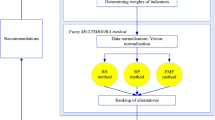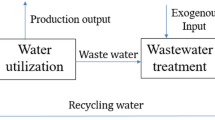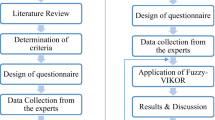Abstract
Measuring the performance of national wastes is essential for ensuing the environmental protection and moving toward the circular economy objective. To cope with the uncertainty involving in many circular indicators, this study first proposed a fuzzy game approach network data envelopment analysis model for the waste management evaluation. The proposed model considers maximizing the potential joint efficiencies of the production and recycling processes simultaneously from the centralized control and circular economy perspective. A real-case study on assessing the waste management performance of European Union countries is provided. The factor efficiency analysis and associated ranks of the process efficiencies provide a guidance for identifying the factor dominance in the production and recycling processes. A comparison of the proposed method with other approaches is also included. Our results provide the European Union policy makers a valuable information to move waste management up the European Union waste hierarchy by allowing reusing, recycling, and recovering energy from the waste.




Similar content being viewed by others
References
Romano, G., Molinos-Senante, M.: Factors affecting eco-efficiency of municipal waste services in Tuscan municipalities: an empirical investigation of different management models. Waste Manag. 105, 384–394 (2020)
Sarra, A., Mazzocchitti, M., Rapposelli, A.: Evaluating joint environmental and cost performance in municipal waste management systems through data envelopment analysis: scale effects and policy implications. Ecol. Indicat. 73, 756–771 (2017)
Tsalis, T., Amarantidou, S., Calabr‘o, P., Nikolaou, I., Komilis, D.: Door-to-door recyclables collection programs: willingness to participate and influential factors with a case study in the city of Xanthi (Greece). Waste Manag. Res. 36(9), 760–766 (2018)
Pérez-López, G., Prior, D., Zafra-Gómez, J.L.: Temporal scale efficiency in DEA panel data estimations. An application to the solid waste disposal service in Spain. Omega 76, 18–27 (2018)
Halkos, G., Petrou, K.N.: Assessing 28 EU Member States’ environmental efficiency in national waste generation with DEA. J. Clean. Prod. 208(20), 509–521 (2019)
Zhang, J., Du, Z., Fu, L., Han, Y., Zheng, W., Yu, F., Chen, H., Feng, L., Li, Y., Ping, W.: Novel anaerobic digestion and carbon dioxide emissions efficiency analysis of food waste treatment based on SBM-DEA model. J. Clean. Prod. 328, 129591 (2021)
Eydi, A., Rastgar, S.: A DEA model with dual-role factors and fuzzy data for selecting third-party reverse logistics provider, case study: hospital waste collection. Ain Shams Eng. J. 13(2), 101561 (2022)
Struk, M., Bod’a, M.: Factors influencing performance in municipal solid waste management V A case study of Czech municipalities. Waste Manag. 139, 227–249 (2022)
Wu, H., Liu, Y., Xia, Q., Zhu, W.: Measuring efficiency of recycling systems based on data envelopment analysis (DEA) network: a case from Chinese provincial circular economy. Environ. Eng. Manag. J. 13(5), 1089–1099 (2014)
Sun, J., Li, G., Wang, Z.: Technology heterogeneity and efficiency of China’s circular economic systems: a game meta-frontier DEA approach. Resour. Conserv. Recycl. 146, 337–347 (2019)
Ding, L.-L., Lei, L., Wang, L., Zhang, L., Calin, A.C.: A novel cooperative game network DEA model for marine circular economy performance evaluation of China. J. Clean. Prod. 253, 120071 (2020)
Carlsson, C., Korhonen, P.: A parametric approach to fuzzy linear programming. Fuzzy Sets Syst. 20, 17–30 (1986)
Author information
Authors and Affiliations
Corresponding author
Rights and permissions
Springer Nature or its licensor (e.g. a society or other partner) holds exclusive rights to this article under a publishing agreement with the author(s) or other rightsholder(s); author self-archiving of the accepted manuscript version of this article is solely governed by the terms of such publishing agreement and applicable law.
About this article
Cite this article
Liu, FB., Hu, CF. Fuzzy Game Approach Network Data Envelopment Analysis Models for the Waste Management Performance Evaluation. Int. J. Fuzzy Syst. 25, 3193–3203 (2023). https://doi.org/10.1007/s40815-023-01565-3
Received:
Revised:
Accepted:
Published:
Issue Date:
DOI: https://doi.org/10.1007/s40815-023-01565-3




